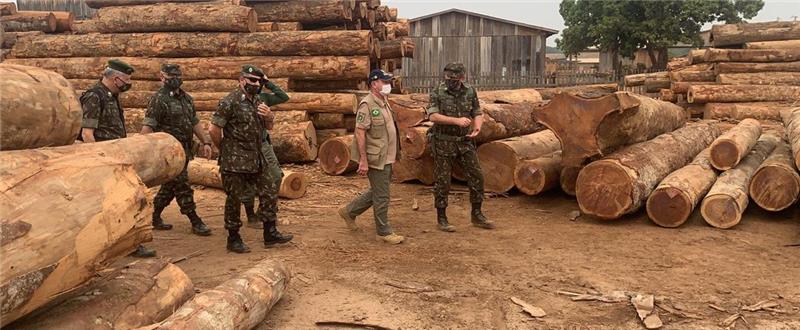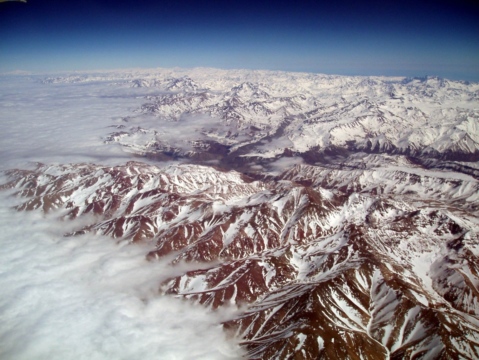
Rousseff’s Visit to Washington
Rousseff’s upcoming visit presents an important opportunity to advance the global climate agenda.
A Daily Publication of The Dialogue
Brazilian Vice President Hamilton Mourão said Oct. 26 that the government will extend through April the military’s deployment to fight deforestation in the Amazon. President Jair Bolsonaro ordered the deployment last May, repeating a similar action from last year when fires spiked in the rain forest. How effective has Brazil’s military been at fighting Amazon deforestation? To what extent has Brazil’s use of technology, such as satellites, aided the military’s efforts in the Amazon? Can new technologies play a bigger role in combating environmental degradation and illicit activity in Brazil, and should multilateral institutions help in financing such efforts?
Anya Prusa, senior associate at the Brazil Institute and Slater Family Fellow at the Woodrow Wilson International Center for Scholar: “Deforestation will persist in the Amazon as long as the economic framework incentivizes deforestation: cleared land is worth more than forested land; clearing new land is cheaper than improving the poor soils of already-cleared land; and the chances of getting caught and fined—or going to jail—for land-grabbing and illicit deforestation are increasingly low. Technology can play a substantial role in changing this economic calculus, from better monitoring and enforcement to the development of new economic markets that promote sustainable activities in the Amazon region. The agencies traditionally tasked with combating deforestation in Brazil, including IBAMA, ICMBio and the National Institute for Space Research (INPE), have long been recognized as global leaders in the technical expertise to combat deforestation. However, budget cuts and understaffing, as well as the decision to transfer authority for combating deforestation and fires in the Amazon to the military, have left much of this expertise on the table. INPE’s world-class satellite images and data, for example, are no longer being used to target violators and enforce environmental regulations. Instead, technology’s potential to combat environmental degradation and illicit activity is being harnessed by nongovernmental groups, researchers and the private sector. A handful of Indigenous tribes are using drones to track and report deforestation from illicit logging, ranching and wildcat miners. Under pressure from investors, a major meatpacker has vowed to use blockchain technology to monitor its entire Brazilian supply chain by 2025, including indirect suppliers, to curb cattle laundering. Other companies are developing precise, real-time tracking of carbon emissions to create functional carbon offset markets that offer financial incentives for conservation and lower-impact agriculture. Artificial intelligence can be used to monitor the health of trees and forests, and predict which areas are most susceptible to fire and disease. In the absence of government action to enforce environmental regulations, these types of initiatives have the potential to help reshape the economic structures that incentivize land clearing.”
Christian Poirier, program director at Amazon Watch: “Since last year’s catastrophic Amazon fires profoundly damaged Bolsonaro’s reputation and jeopardized key global market relationships, his regime launched Operation Green Brazil. This was an attempt to show its response to spiking environmental crime and impunity by deploying hundreds of soldiers to police the Amazon. However, between May and August 2020, while the operation unfolded in the Amazon, the number of fires reached 39,187, essentially the same as in 2019 (38,952). This October’s 17,326 Amazon hotspots were more than double the number of fires detected last October. The numbers do not lie. In fact, they prove the tragic failure of military-led environmental enforcement, touted by Bolsonaro as a means to combat Amazon deforestation. Brazilian civilian space agency INPE’s use of satellite technology and scientific analysis have played a fundamental role in tracking Amazon deforestation over the last 30 years, and in the process have informed public policies that effectively contained deforestation. However, since Bolsonaro took office, he has repeatedly demoralized the agency with unfounded criticism, fired key INPE officials and undermined its organizational structure. In doing so, his regime has made the country far less effective in tackling illegal deforestation and ensuing fires. By ignoring the technical expertise of environmental professionals to give positions to military officials with limited environmental knowledge, the regime also showed its true colors, allowing deforestation and fires to explode while disregarding the very tools capable of containing Amazon destruction.”
Thomas Dolzall, defense analyst at Forecast International: “Over the past four decades, Brazilian institutions have conducted pioneering work into the utilization of advanced new technologies to observe and contain sources of environmental degradation in the Amazon rain forest. The state’s effective deployment of these tools has only become more critical to securing the region’s future, as shifting climatic conditions and unregulated economic development have steadily accelerated the rate of deforestation and heightened the long-term danger to the rain forest’s ecology. The scale of 2019’s wildfire crisis jolted the presidential administration of Jair Bolsonaro to better leverage the federal government’s technological assets in tandem with the manpower largess and projection capacity of the armed forces toward these ends. Geospatial assets managed under the National Institute for Space Research (INPE) provide authorities with the means to identify and track emerging and active crisis points in real time. Such assets can be a powerful mechanism for facilitating the agile and efficient allocation of military resources toward managing the deforestation challenge. Yet, despite the bevy of additional resources recently devoted to containment, recent data released by INPE indicates that these efforts have generated only ephemeral success in forestalling the pace of ecological destruction in 2020. Responsibility lies primarily with federal economic and developmental policies that act at cross-purposes with the cause of environmental protection in the Amazon. Fundamentally, neither cutting-edge technological solutions nor localized acts of military valor can compensate for the absence of sound policy planning at the national level, leaving regulatory and military personnel locked in a Sisyphean struggle.”
Mariana Lyrio, consultant at BMJ Consultores Associados: “Operação Verde Brasil 2 has not yet demonstrated evident effectiveness. Data from the National Institute for Space Research (INPE) show that, up to Oct. 23, there was a 37 percent increase in deforestation, as compared to the whole month of October 2019. Deforestation declined in July, August and September, as compared to the data from those months in 2019, which reached record levels. Therefore, despite the decrease, the numbers remained higher than the historical average. The military has various technological devices to support its operations. Importantly, it has access to INPE’s Deter-Intenso, which generates an updated image every 24 hours of five critical areas that hold about 45 percent of the deforestation in 2020. The images started being disclosed in February and show the state of deforestation even with the presence of clouds. One possible explanation for the still incipient results of the operation, despite the advanced technology, is the lack of coordination between the military and the Institute of Environment and Natural Resources (IBAMA), the agency that is traditionally responsible for inspection actions in the Amazon. As for international financing, U.S. President-elect Joe Biden has already said he wants to organize a $20 billion fund for the Amazon. Brazilian President Jair Bolsonaro rejected the proposal, but diplomats linked to the Democrats believe that the Brazilian government won’t oppose the plan once it becomes official. Considering the history of the paralyzed Amazon Fund, financing from multilateral institutions has proven useful in combating deforestation in the Amazon.”
Joel Korn, president of WKI Brasil and senior international partner at UPITE Consulting Services: “Official reports for October registered 17,000 fire spots throughout the region, a record for any month in the past 10 years. Despite the insufficient progress and controversial views about the effectiveness of the military forces, the ongoing collaboration with the region’s state governments is a positive step to regularize properties in rural areas engaged in sustainable activities, the enhancement of logistical support for the surveillance of borders, critical conservation areas and Indigenous land. The military mobilization and leveraging technology should not be seen, however, as a solution in itself for the current administration’s poor track record in environmental conservation. The strengthening of the established agencies’ roles and objectives and enforcement of the applicable measures against illegal and predatory activities should be a move of paramount importance for the protection and sustainability of the ecosystems. It is absolutely essential to restore the government’s credibility to carry out the crucial actions required to reduce emissions and preserve Brazil’s rich biodiversity. The absence of bold environmental policies and its effective implementation will continue hindering the country’s ability to enter into bilateral and multilateral agreements and access to external financing, except for specific programs with limited scope. On the positive side, we are witnessing an unprecedented commitment within the private sector toward social and environmental responsibility, urging the current administration for overdue changes. Hopefully, political pragmatism will trigger adjustments in the government’s policies aiming at aligning it with domestic and international expectations. The outcome of the U.S. elections may be a contributing factor in this direction. ”
 The Latin America Advisor features Q&A from leaders in politics, economics, and finance every business day. It is available to members of the Dialogue’s Corporate Program and others by subscription.
The Latin America Advisor features Q&A from leaders in politics, economics, and finance every business day. It is available to members of the Dialogue’s Corporate Program and others by subscription.
Rousseff’s upcoming visit presents an important opportunity to advance the global climate agenda.
Though the COP21 negotiations promise to be complex, they also present an opportunity for the region to address existing vulnerabilities.
Peace in Colombia promises to bring many environmental benefits to the country, but also poses environmental risks .
 Brazil’s government has been using the country’s military to fight deforestation. Defense Minister Fernando Azevedo (second from right) is pictured last month at the site of an illegal logging operation. // Photo: Brazilian Defense Ministry.
Brazil’s government has been using the country’s military to fight deforestation. Defense Minister Fernando Azevedo (second from right) is pictured last month at the site of an illegal logging operation. // Photo: Brazilian Defense Ministry.

